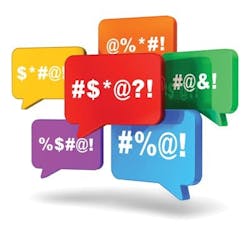The Presentation Curse
On March 28, 1965, in an episode of My Favorite Martian, Doris Packer, as Miss Pringle, did the unspeakable when her character received an award for Teacher of the Year. In an attempt to mask her emotions as she accepted a gold watch, she quipped, “Damn thing probably doesn’t even keep time.” This made television history as the first time the “D” word was said on a prime-time sitcom. Of course, there were other egregious moments on broadcast television before this, like the “obscene” gyrations of Elvis’s pelvis, but tender eyes were saved by the Ed Sullivan Show only filming him from the waist up.
Evolution of Leniency
In 1960, the Federal Communications Commission was granted the authority to enforce strict fines for profanity on television. But some shows, such as Star Trek, dared to push the limits with phrases from the potty-mouthed Captain Kirk, like “Let’s get the hell out of here!” or “What the hell is going on?” in the episodes “The City on the Edge of Forever” and “The Doomsday Machine,” respectively. (Is my inner nerd showing?)
Over the course of the next few decades, the popularity of cable television networks grew, and in 1983, when Eddie Murphy let the “F” word fly nearly 200 times in one HBO special, it was clear obscenity rules were limited to broadcast TV. But even those standards seemed to be loosening, and as I grew up in the ‘80s and ‘90s, hearing “damn” or “hell” on TV never seemed to get a rise.
These days, it is hard for me to distinguish between broadcast, cable or streaming services, but I know I am not even shocked anymore when I hear “sh*t” or its variations on any of the programs I occasionally enjoy.
Recently, when I was listening to a keynote presentation by Ryan Estis at the 2017 WQA Convention & Exposition in Orlando, Fla., what once would have been considered inappropriate language was very much a part of his presentation. He used some words multiple times in a manner that seemed natural. I did not hear any audible gasps, and I doubt there were many offended members of the audience, but it still struck me as odd.
Curated Cursing
I grew up in a pretty conservative environment, but I personally have never been offended by foul language. I mostly have seen it as phonetics and only problematic when it was offensive to those around me. Those who know me personally are aware that I have a warped and sometimes off-color sense of humor.
I know I have occasionally misjudged the appropriateness of my language, but I have, for the most part, maintained the rule of not cursing when I am volunteering at the local school or when I am participating in a business meeting or other professional activity. Catch me on a golf course (if ever there was a game that demanded cursing, it is golf) or hanging out with friends, however, and you will likely find me more uncensored.
Internal Moderator
Though over the past few years it seems to have become more common, I still cringe when I am conducting an interview with a sales professional candidate and he or she lets a curse word fly. I am careful not to use even basic curse words when I am running a sales appointment, and I always encourage the sales professionals I train to do the same.
When a potential candidate curses in an interview, especially without even being seemingly aware of it, it seems they are likely to do the same in front of a prospect.
The acceptable norm for professionalism has been changing for a long time—and maybe I am sounding a bit like an old prude on this issue—but I believe we should err on the side of caution when it comes to language in a sales presentation. In some cases it is obvious that a prospect is not offended by certain words because of the way he or she speaks, but there are some situations, such as a sales presentation or a job interview, when I believe we should present a higher level of professionalism.
If we allow ourselves to blur the lines, it will become much harder to recognize when swearing is appropriate and when it is not. It is possible that as the years progress, the definition of what is acceptable will make a future reader of this article chuckle the way I did when I read about the uproar over Miss Pringle’s ad-libbed “damn” nearly 60 years ago. But I do not believe we are quite there yet, and I do believe we should embrace every opportunity available to give the impression that we are not just salespeople, but rather water treatment professionals.
